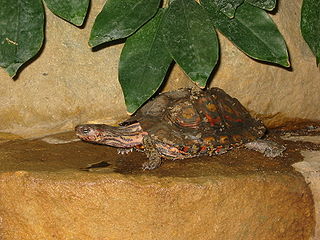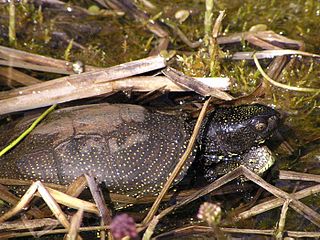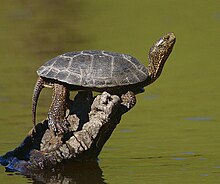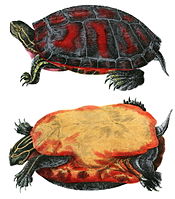
The Geoemydidae are one of the largest and most diverse families in the order Testudines (turtles), with about 70 species. The family includes the Eurasian pond and river turtles and Neotropical wood turtles.

Emydidae is a family of testudines (turtles) that includes close to 50 species in 10 genera. Members of this family are commonly called terrapins, pond turtles, or marsh turtles. Several species of Asian box turtles were formerly classified in the family; however, revised taxonomy has separated them to a different family (Geoemydidae). As currently defined, the Emydidae are entirely a Western Hemisphere family, with the exception of two species of pond turtle.

Emys is a small genus of turtles in the family Emydidae. The genus is endemic to Europe and North America.
Pond turtle may refer to:

The black softshell turtle or Bostami turtle, previously placed in genus Aspideretes, is a species of freshwater turtle found in India and Bangladesh. It was long believed to be inbred individuals of the Indian softshell turtle or the Indian peacock softshell turtle, but while it is a close relative of the latter, it is a distinct species. In the 1800s it was believed these turtles were brought from Iran to Chittagong shrine pond by Hazrat Bayezid Bostami. His turtles he had brought to this pond were treated as sacred and respected by the public. Previously declared extinct by the International Union for Conservation of Nature in 2002, these turtles were found still to exist in a temple's pond called the Hayagriva Madhava Temple located in Assam, and in Kalyan Sagar lake in Tripura Sundari Temple in Udaipur, Tripura, India. Through conservation methods and protection of the species, some of these turtles can be found today throughout the wild, and scientists and environmental biologists are continuing to work hard to preserve this endangered species and their natural habitat. Their mitogenome represents relatedness to 19 other species of the Testudines. When looking at the phylogenetic tree, Nilssonia Nigricans are a species represented as sisters to Nilssonia formosa.

Clemmys is a genus of turtles currently containing a single extant species, the spotted turtle (Clemmys guttata).

The Santa Rosa Plateau is an upland plateau and southeastern extension of the Santa Ana Mountains in Riverside County, southern California. It is bounded by the rapidly urbanizing Inland Empire cities of Murrieta and Temecula to the northeast and southeast, respectively.

The Western Pond Turtle, also known commonly as the Pacific pond turtle is a species of small to medium-sized turtle in the family Emydidae. The species is endemic to the western coast of the United States and Mexico, ranging from western Washington state to northern Baja California. It was formerly found in Canada, but in May 2002, the Canadian Species at Risk Act listed the Pacific pond turtle as being extirpated.
Rodeo Creek is an 8.3-mile-long (13.4 km) intermittent stream in western Contra Costa County, California running through the town of Rodeo to San Pablo Bay.

Glyptemys is a genus of turtles in the family Emydidae. It comprises two species, the bog turtle and wood turtle, both of which are endemic to North America. Until 2001, these turtles were considered members of the genus Clemmys, which currently has one member, the spotted turtle.

The Boggs Lake Ecological Reserve is a nature reserve in Lake County, California. The land area is about one quarter of a square mile and contains a large vernal pool as well as endangered plants such as the Boggs Lake hedge-hyssop.

The false map turtle is a species of turtle endemic to the United States. It is a common pet species. Two subspecies are recognized, including the nominotypical subspecies described here.

The Audubon Kern River Preserve is a riparian nature reserve owned by the National Audubon Society in the US state of California, near Weldon in Kern County.

The Sicilian pond turtle is a species of turtle in the family Emydidae. The species is endemic to Sicily.

The Iberian pond turtle, also known as the Mediterranean pond turtle or Mediterranean turtle, is a species of turtle in the family Geoemydidae. The species is endemic to southwestern Europe and northwestern Africa.

Actinemys pallida, the southwestern pond turtle, is an aquatic turtle of the genus Actinemys in the family Emydidae. It can be found in bodies of water in southern California and Baja California.















